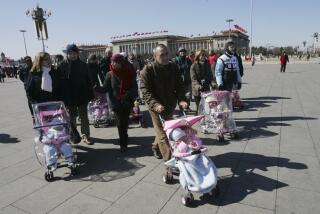Foreign Adoptions Can Mean Joy--or Pain
- Share via
Foreign adoption can be a wonderful, joyous experience. But though there are many successful adoptions from abroad, there are also many horror stories connected to such transactions.
An American woman, thought to have stolen a baby, is beaten into a coma by villagers in Guatemala; a British couple is arrested for allegedly trying to smuggle a baby out of Romania; birth mothers are paid to hand over their newborns; infants are bought and sold on the black market.
Some of these cases are extreme, but there are commonplace concerns for prospective parents, not the least of which, say experts, is the American middleman, who claims to have the best possible connections to foreign babies, and wants a nice fee for the services.
“Facilitators pose themselves as authentic, but none of them are licensed by the State Department,” said Hemlata Momaya, founder and director of the Chatsworth-based Bal Jagad Childrens World, a licensed adoption agency specializing in babies from India, China, Romania, Eastern Europe, Russia, South America and elsewhere.
Middlemen, said Momaya, can ask from $15,000 to $25,000, “with $5,000 or $6,000 going straight into their pockets.” When dealing directly with a foreign orphanage, she said, the entire adoption process costs about $10,000.
An added risk with middlemen is that they have been known to accept payment in advance and never come back with a child.
Regardless of how an adoption is achieved, with foreign adoptions, the child’s health can be a grave issue. Though a would-be parent may request a healthy child, the definition of healthy varies from country to country.
“In India, a baby who is born at six pounds is healthy. In America it is considered malnourished and weak,” said Momaya. “Typical handicaps we can tell specifically, but when they just say healthy, we just don’t know.” Photos, and sometimes videos, of the baby can be helpful.
Then, like in all adoptions, there is always a chance that the birth mother will decide she wants to keep her baby, which, according to Momaya, happens with about 1% of foreign adoptions.
In addition to a change of heart on the mother’s part, a change of political climate in the foreign country can affect an adoption already in process.
“Lawyers can go on strike; airlines can go on strike; there may be hostages, bombings,” said Momaya. “Unavoidable situations can come up, and everything can change.”
More to Read
Sign up for Essential California
The most important California stories and recommendations in your inbox every morning.
You may occasionally receive promotional content from the Los Angeles Times.













